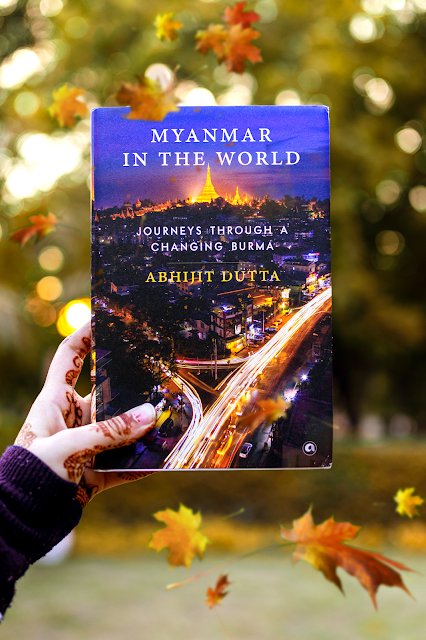Myanmar in the world : Journeys through a changing Burma
Author : Abhijit Dutta
Genre : Non-fiction
Number of pages : 372
Genre : Non-fiction
Number of pages : 372
"At the end of 1950, half a million Indians were still living in Burma. Some had taken citizenship, some found a way to retain their livelihoods while maintaining their Indian nationality, while others chose to live without identity cards. Their children spoke Burmese, took Burmese names and strived to integrate themselves more fully into Burmese society. it is there lives that are still in evidence in Yangon and across Myanmar, the men and women who can carry on a conversation in Urdu and bear their Indian names as a second, softer, skin"
Myanmar. Burma. Two names, the same country yet a lot has changed. Dutta in his book captures the past and present of Myanmar providing excerpts from various books as we read along and his interaction with the locals.
The writing style is so effortless that at no point did I question, "how did we reach here?" The book is divided into four parts, starting from the history of the country to the final part which talks about the present state of the country. This book is literally a quick guide which explains all about Myanmar.
Everyone knows about the on-going Rohingya crisis and Dutta has dedicated a full part of the book (the third part) to it, talking and discussing all about the root cause of it and what's the present situation. He even visited various refugee camps of Hindus and Muslims to know more about the present situation and he has brought out the true nature of it very smoothly through his words.
Not only the Rohingya crisis, the author also discusses the struggle of Indians from the time they settled in Burma to the time when they eventually either had to move out or become Burmese after WWII.
- "A new city would have to be built. A new city to go with the new country that was about to be born: Independence was in sight, what remains the same was the antipathy to Indians. "
- "It takes more than casual racism and discriminatory policy to uproot people from their home. It had to wait till the world war had broken out and bombs were falling on people's head."
Dutta, even went on to talk about the government, the military rule and the ARSA in Myanmar, again from their inception to the present situation.
In a nutshell, this book provides a lot of insight and knowledge about Myanmar. It checks out all the boxes of a good book and I would surely recommend it to anyone wanting to read about Burma.
My Verdict : 5/5



Comments
Post a Comment